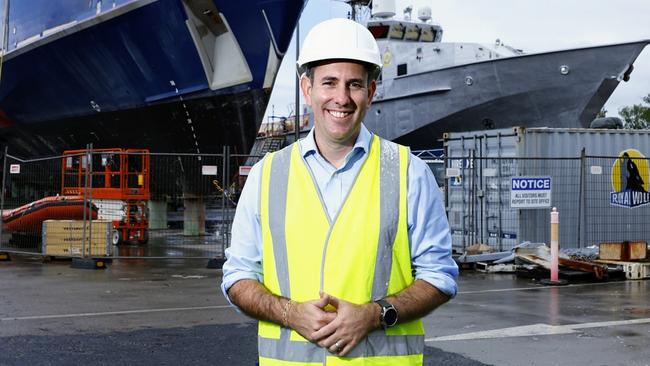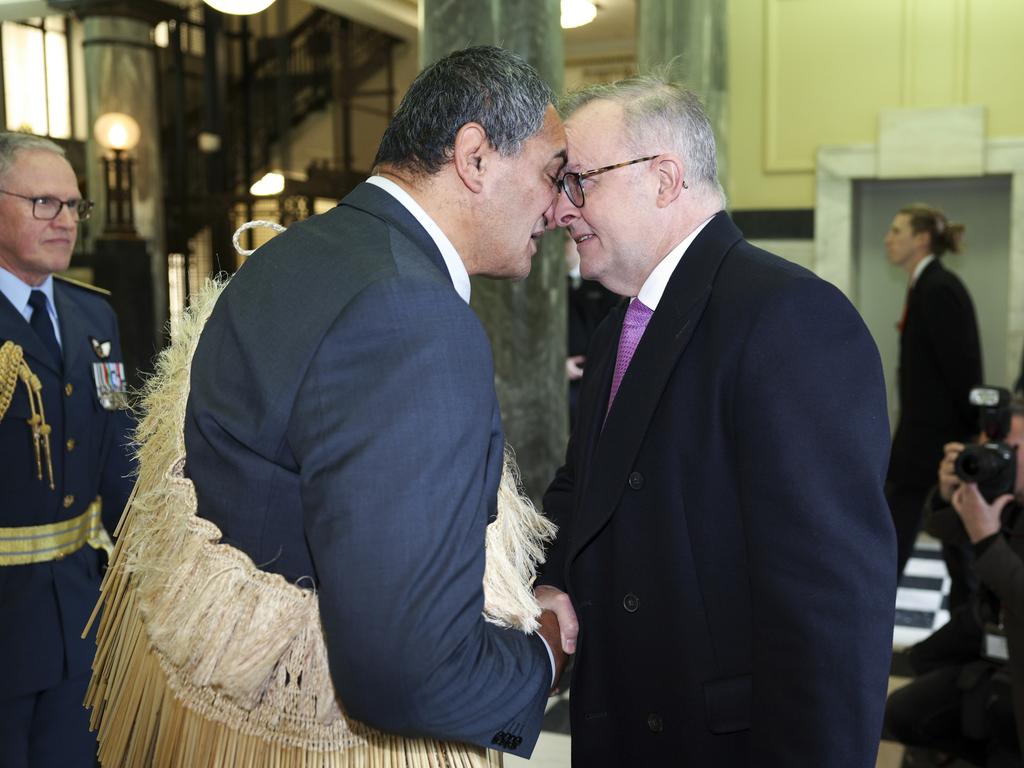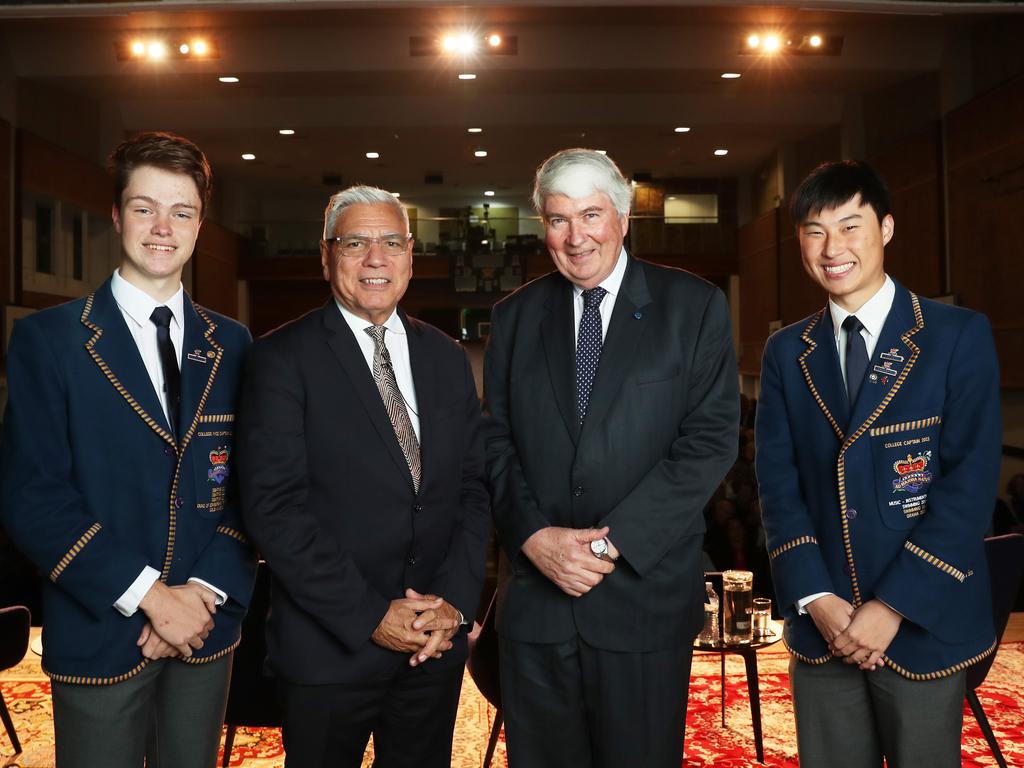Vote yes for value: Jim Chalmers’ Indigenous voice to parliament pitch
Jim Chalmers says Australians aren’t getting ‘value for money’ from billions spent on Closing the Gap and champions the voice as ‘good economic policy’.

Jim Chalmers has warned that Australians are not getting “value for money” from billions of dollars spent on Closing the Gap and declared an Indigenous voice will be a good economic policy that will reverse decades of failure.
Amid falling support for Anthony Albanese’s referendum to constitutionally enshrine a voice to parliament and executive government, the Treasurer has linked consistently poor Closing the Gap results with the need to target funding better across Indigenous communities.
Dr Chalmers, the highest-ranking federal Labor MP in Queensland – where a majority of voters has swung against establishing an Aboriginal and Torres Strait Islander advisory body – says the voice is “good economic policy”.
“In total, the commonwealth spent $2.64bn last financial year aimed at closing the considerable gap between Indigenous and non-Indigenous Australians,” says Dr Chalmers, writing in The Australian.
“But these significant investments aren’t driving the significant outcomes Indigenous Australians need and deserve. From all of this, one conclusion is clear: what we’ve done for the last decade hasn’t worked.”
The Yes23 and No teams have ramped up campaigning operations ahead of next week’s Garma festival and amid rising expectations the Prime Minister is preparing a referendum date in October following the AFL and NRL grand finals.
Invoking Closing the Gap data that shows just four out of 19 targets are on track, Dr Chalmers says the voice is about “recognition, listening and making sure the billions of dollars we invest in programs are getting value for money and improving lives”.
“If we’re going to make responsible investments in the future that achieve what we need and what we want for our people, our country and our community, we need the voice to get there,” the Treasurer writes.
“It will help government listen to locals and direct money to where it’s needed and working. The latest Closing the Gap data shows that we are failing future generations of Aboriginal and Torres Strait Islander people.
“The Productivity Commission (draft review) showed how top-down, business-as-usual approaches aren’t working.”
Dr Chalmers’ intervention, which will be welcomed by Yes23 campaigners seeking to make up ground in Queensland, follows similar pitches from Health Minister Mark Butler and Education Minister Jason Clare who have tied the voice to better health and education outcomes.
The Treasurer says shifting the dial on outcomes for Indigenous Australians will ensure “better value for our investments”.
“We’ve got to do something different,” he says. “Through listening and collaboration … the voice will deliver a framework for a better future for Aboriginal and Torres Strait Islander Australians. Better policy outcomes will deliver better economic outcomes. We know that Indigenous Australians often face barriers to jobs and building businesses of their own.”
The Albanese government last week announced work on a new universities accord, which is considering public funding to enrol every Aboriginal and Torres Strait Islander who meets academic entry standards and affirmative action to help disadvantaged students graduate with degrees.
Dr Chalmers says constitutional recognition through a voice will “light the path to a better, stronger and more united Australia”.
“We want to see Indigenous communities thrive with more young people finishing school, finding work and starting a business and that’s what the voice will help to facilitate,” he says.
“There is no greater chance to make a practical difference to some of the most disadvantaged communities in Australia than by voting yes for the voice.
“Through recognition and through listening, the voice will improve outcomes for Indigenous Australians and deliver value for money on our investments. It’s a once-in-a-generation opportunity to move Australia towards a better future.”
The Australian’s Newspoll published this month revealed falling support for a constitutionally enshrined voice. The survey of 1570 voters showed 48 per cent of Australians would vote no, compared with 41 per cent who pledged support for Labor’s constitutional amendment.
However, the Yes23 campaign remains confident that it can swing soft No votes and secure backing from Australians who are undecided on how they will vote at the referendum.
With a majority of voters in Queensland and Western Australia consistently trending No, the key battleground states for the Yes23 and No campaigns are South Australia and Tasmania.
Dr Chalmers this week revealed he would campaign in Queensland and across the country in support of the Yes vote.
“All of us who are passionate about a Yes vote in this referendum – we all need to put the work in and we will and so I will be an enthusiastic part of that campaign,” he said. “I recognise historically that Queensland has been a difficult place to make the case for changes like this one, but that fires me up more rather than deters me and I look forward to making the case.”
West Australian Labor MP Patrick Gorman, the Assistant Minister to the Prime Minister and the Public Service, delivered a speech in Perth on Thursday declaring his home state as having a “proud history of Aboriginal achievement”.
“This gives me hope that we will, as a state, also support recognition of the First Peoples of Australia in the constitution through a voice,” Mr Gorman said.
He said a successful referendum would ensure that Indigenous voices were “heard and listened to … delivering better policies in areas like health, education, jobs and housing – and, ultimately, improving lives”.
“The idea for a voice comes from First Nations people themselves through the Uluru Statement from the Heart. It represents decades of work towards recognition. And the referendum later this year gives us a chance to become reconciled with our past and move to a better future,” he said.








To join the conversation, please log in. Don't have an account? Register
Join the conversation, you are commenting as Logout